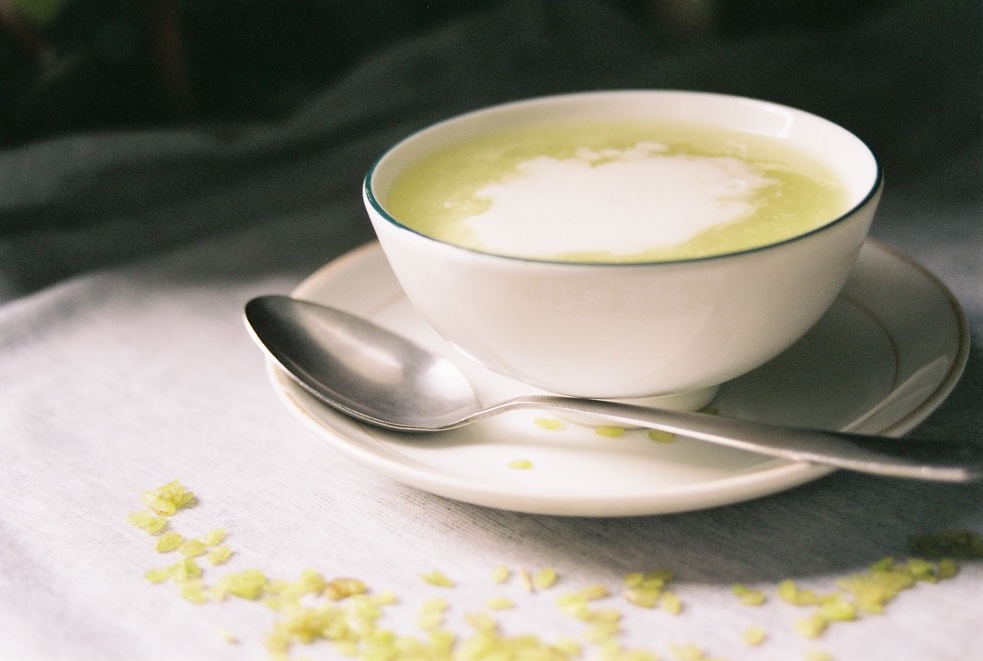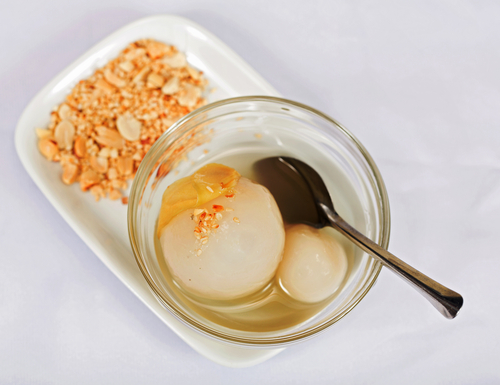It’s no secret that Vietnam has a sweet tooth. In the west, something sugary may be the last course of a meal. Here, dessert bars universally recognized by sign boards labeled “Chè” are packed at any hour of the day, even when their set-up is as humble as an auntie by her big pot and a few plastic stools.
What is it, though? With origins in Cantonese cuisine, chè is the name for any Vietnamese sweet soup (with the exception of a few peculiar savory options), the ingredients of which can range from beans, grains, jellies, fruits or a mix of all the above.
The dessert is enjoyed across all of Vietnam, and the nation certainly has a few favorite classics like chè sen or tào phớ. Though, if you’re willing to give varieties from each region a try, perhaps you’ll find it fascinating how all the local chè have in them a little something of the area’s distinct flavor profile — the same way one could easily tell apart northern and southern phở.
If you have a taste for something light, refreshing and has just the right note of sweetness, allow Vietcetera to introduce you to three qualifying signature chè recipes from Hanoi, where glutinous rice and mung beans are staples. Hopefully they’ll help you wash down some of the delectable savory home dishes we brought to you last week?
Chè cốm

This invigorating chè embodies the breezy spirit of Hanoi autumn. Green-colored cốm, or young glutinous rice, is a beloved specialty of the capital region that is in season around September every year.
Ingredients:
- 100g fresh cốm (young glutinous rice)
- 100g sugar, or adjust to your liking
- 1 tsp tapioca starch
- 400ml water, or adjust to your liking
- 0.5 tsp pomelo blossom extract or half a vanilla pod
Instructions:
- In a pot, cook water with sugar on high heat until dissolved.
- Lower the heat to a medium and add tapioca starch. Stir well until the mixture thickens.
- Lower the heat to a simmer and add cốm to the pot. Stir well gently.
- When the cốm grains have bloomed, turn off the heat and let cool for a few minutes before adding vanilla or pomelo blossom extract. Stir well before preparing into servings. Enjoy when warm!
Chè hoa cau xôi vò

This chè with xôi (glutinous rice) fusion dish is representative of Hanoi cuisine — modest and refined. While you might be thinking the star of the dish must be a part of its name, it’s actually mung bean. Surprisingly, the fancy name hoa cau, or areca flowers, comes from the fact that cooked mung beans share the pastel gold shade of these flowers.
Ingredients:
- 500g glutinous rice
- 500g peeled and split mung beans
- 4 tsp sugar
- 2 tbsp salt
- 1 tsp cooking oil
- Water
Instructions:
- Prepare mung bean: Sort out firm and even grains to mix with 1 tsp salt, then soak for 5 hours for the beans to soften. Next, bring the mixture to a steam. Be careful not to crush the beans for the best presentation effect.
- Prepare tapioca starch: Boil sugar with 2l of water until dissolved in a pot. Add in tapioca starch and stir well until mixture thickens. Then add a quarter of steamed mung beans from step 1 into the pot. Stir gently. This will be your chè component. Take off from the heat and prepare into servings.
- Prepare glutinous rice: Wash and soak in water then let dry. Mix with 1 tsp salt.
- Grind the remaining mung beans from step 1 then divide in two amounts. Take one to mix well with rice and 2 tsp cooking oil, so the grains won’t stick together later. Steam everything for 20 minutes or until well-done. Pat dry with a towel any water droplets on the lid during the process.
- Take the second amount of mung beans left to mix well with rice, now already cooked. Then steam for another 5 minutes. Take off from the heat and add a spoonful of sugar. Mix well. This will be your xôi component.
- In a bowl, top off chè with xôi and enjoy!
Chè trôi nước

More commonly known as bánh chay in the north, chè trôi nước is quite literally “floating rice dessert”. It features glutinous rice balls in a syrup, filled with mung bean and garnished with sesame seeds. Hanoians love to enjoy chè trôi nước during Tết Hàn thực — a holiday on March 3 of the lunar year, when anyone celebrating makes cold dishes to honor their ancestors.
Ingredients:
- 200g peeled and split mung beans
- 400g glutinous rice flour
- 1 tsp salt
- 1 tbsp sugar
- 3 tbsp crispy fried shallots
- 3 tbsp vegetable oil
- 1 piece ginger, julienned
- Roasted sesame seeds
Instructions:
- Prepare mung bean: Wash and soak in water for at least 1 hour, then cook until soft. Add salt, crispy fried shallots and vegetable oil to the beans, then grind into a paste.
- Grease hands with vegetable oil. Shape the paste into balls worth about 1 tbsp.
- Prepare rice dough: Gradually add water to glutinous rice flour and mix well. Knead to form a dough, then cover and let rest for half an hour before kneading again for a few more minutes.
- Pinch a piece of dough and form a ball. Then flatten it out to place a mung bean ball from step 1 in the center. Pinch the edges together to seal, then roll the ball in your hands to smoothen it. Place on a baking sheet or greased surface to avoid it getting sticky.
- In a pot, bring water to a boil and gently drop in the stuffed rice balls. Cook on medium heat until they float to the surface. Then transfer to a bowl of cold water.
- Prepare ginger syrup: In another pot, boil water, sugar, salt and ginger. Then simmer on medium-low heat for 5 to 10 minutes for ginger to infuse the syrup.
- Serve the syrup in a bowl and transfer the cooked rice balls to it. Sprinkle roasted sesame seeds on top. Enjoy!
